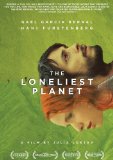| Reviews & Columns |
|
Reviews DVD TV on DVD Blu-ray 4K UHD International DVDs In Theaters Reviews by Studio Video Games Features Collector Series DVDs Easter Egg Database Interviews DVD Talk Radio Feature Articles Columns Anime Talk DVD Savant Horror DVDs The M.O.D. Squad Art House HD Talk Silent DVD
|
DVD Talk Forum |
|
|
| Resources |
|
DVD Price Search Customer Service #'s RCE Info Links |
|
Columns
|
|
|
Loneliest Planet, The
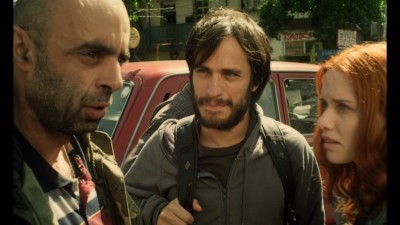
I've always found it a shame that writer/director Julia Loktev's highly impressive debut narrative feature, 2006's Day Night Day Night (a terrorist procedural as brilliant, riveting, and moving as it is disturbing, offering no specifics as to the attacker's motivating beliefs other than that the characters in the film believe they're worth killing for) didn't find as large an audience as it deserved. The audacity of that film's theme and story were readily matched by Loktev's fantastic eye for images, lean and razor-sharp way with narrative, and preternatural feel for pacing, montage, and performance; it was clearly the work of someone with vision, integrity, and skill to spare. Now, in her latest film, The Loneliest Planet, Loktev has put those considerable gifts at the service of a less directly political, hot-button story. But anyone who saw how almost unbearably intimate and fog-thick with restrained emotion Loktev made the time we spent with Day Night Day Night's sweet, vulnerable, conviction-possessed young woman (despite her getting a bomb strapped onto her) could attest to how even better-suited that slow, immersive intensity could be to a story about the vicissitudes of romantic love. That's what The Loneliest Planet is on its most basic level, a love story; it does have an ongoing political subtext that becomes explicit just long enough to overlap with its most intense moment, but that's all it needs to set up its own ticking time bomb, a tinderbox of emotion that comes into being when feelings of deep, committed love are confronted with a very human but deeply devastating capacity for weakness and betrayal.
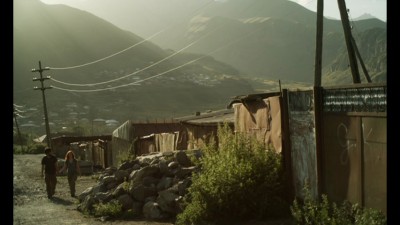
It's a much more subtle form of weakness and betrayal than the standard act we get from dramas, however; it's hardly as if Alex (Gael Garcia Bernal) would ever cheat on his fiancée, Nica (Hani Furstenburg) with another girl. The extent to which this comfortable, intelligent North American pair (he's Mexican; she seems to be American) are in love, with each other and in some ways, as a couple, with the whole world, is what the first half or so of the film is devoted to convincing us of. As the two cavort and frolic with the family putting them up in a little Georgian village at the foot of the Caucasus Mountain range; playfully explore the town and hire a guide, Dato (Bidzina Gujabidze), for their planned sojourn into the mountains' vast natural beauty; and do head-standing yoga poses, play Spanish verb games (the Mexican Alex is teaching the apparently American Nica), and roll down hills together after their hike commences, we're immersed in the sheer joy they take in each other and in their innocuous, breathtaking adventure. In fact, only Loktev's observational, offhand rhythms and visual sense, and the gorgeous, often hand-held cinematography (on the RED digital camera) by Inti Briones, keeps us from sometimes rolling our eyes or getting exasperated by these sweet, good-looking, earnest bourgeois bohemians and their relatively paradisiacal, globetrotting existence. For example, "a bike" is Alex's cheerful answer to the older, car-loving, at least somewhat economically disadvantaged Dato's curious query as to what magnificently cool vehicle such a clearly financially comfortable Westerner might be privileged to have use of back home. The truth being very subtly and calmly revealed is that Alex, unlike his guide, has multiple choices and could probably have a nice car if he wanted, and his response, with its somewhat naïve first-world brew of utterly well-intentioned ethical awareness but less-than-complete thoughtfulness or empathy, has a ring all too familiar to those of us who live in Seattle or San Francisco or Austin or other Portlandias around the country. But this isn't Portlandia; Loktev is out to avoid, not embrace, the kind of cut-and-dried decisiveness that facilitates caricature or satire. It's exclusively the gray areas she's interested in, so the answer to whether the couple is being glib and entitled by making the world their playground, or are on the other hand deserving of some slack because of their sincerely respectful efforts to know and understand other regions/cultures first-hand, is probably "both," either description true to a greater or lesser degree depending on the situation.
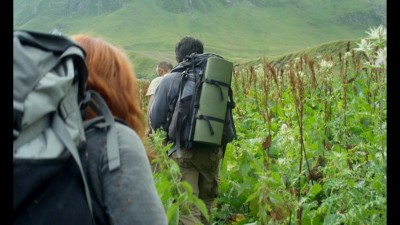
The languorous love parade of besotted coupledom, endlessly sublime vistas, and a jovial relationship with their guide peppered with mutually amusing misunderstandings is halted by the film's one sharp, sudden, and startling bit of heightened, adrenaline-eliciting action; it's the only moment to which "spoiler" could apply, so suffice it to say that when our trio of mountaineers comes across some rural folk skeptical of the strangers, and a not-so-amusing cross-cultural misunderstanding leads to a tense moment of potential violence, Alex's behavior, carried out reflexively in the blink of an eye, gives Nica and their guide reason to doubt how deep his dedication to her runs when push looks like it's going to come to shove. The shocking tension of the situation is defused as quickly as it reared its head, but Alex's moment of weakness hangs over the rest of the film. We're still in the gray areas, but the stakes are raised; the little misunderstandings and peccadilloes of the first half's fresh-young-love travelogue now seem benevolent by contrast. Now, Alex's and Nica's wide-eyed quality seems potentially dangerous; a long-abandoned, war-torn-appearing house the hikers come across not long thereafter is another indicator of how, unbeknownst to or blissfully ignored by these two more-serious-than-usual tourists from a more peaceful and prosperous part of the world, most who actually live in this region they've decided to explore might be obligated by horrifying history to expect the worst from any unfamiliar element.

Deeply gray-zoned as well are the affective responses and ongoing repercussions within each character after the incident, a brief descent into nightmare which is never spoken of, hashed out, or processed verbally in any way. Instead, the mood and tone change; there's much less playful bounding up hills and much more hangdog trudging, and we can gauge how deep and wide the wound is between Alex and Nica -- and what the prognosis for any healing at all, let alone how much -- by the physical distances they maintain or close between each other as they continue; by how very few words becomes none, and then a few again; by whether a painfully tentative reaching out by the humiliated, ashamed Alex is welcomed or spurned by Nica. Dato is a vital, triangulating presence whose own history (he has greater experience at many levels of life) and feelings further complicate Alex and Nica's feelings (Alex can only appear weaker standing/walking next to someone who's actually lived through and survived hardships, and own loneliness, which emerges as he becomes more comfortable speaking to Nica, has led to longings for her that now, in the wake of the strain between the two younger travelers, seem more possible to express).
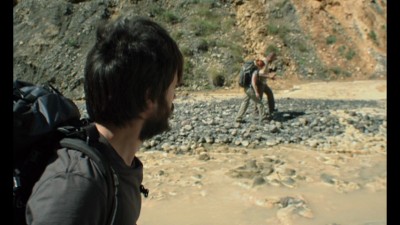
Loktev's style allows for an extraordinary, true naturalism; The Loneliest Planet's "slowness" of pace and what seems, in typically dialogue-heavy narrative-feature territory, like its near-muteness allows every nuance of feeling to play out physically, with a powerful, uncontrived flow that's as evident and unspoken as the variable currents of one of the several streams Nica, Alex, and their guide must cross on their route. Her usually handheld and mobile images might resemble documentary/direct-cinema on-the-spot improvisation, but that's an apparent immediacy resulting from the most tightrope-walking care and intuitiveness on Loktev's part; The landscape is uniquely swoon-inducing, but she uses it for much more than postcards, with the particular way in which it allures, its difficulties and unpredictabilities, all well-integrated into the moment-by-moment experiences of the characters, in which we feel along with them every literal and figurative heartbeat, with breathers from that intimacy provided by sudden cuts to intermittent interludes in which Loktev gives us the widest shots imaginable (the three figures look like ants from this far away, to coin a phrase), accompanied by Richard Skelton's stark, stately Arvo Pärt-like music -- a glimpse of the heaven of greater perspective that Alex and Nica are only now discovering they might be in need of.
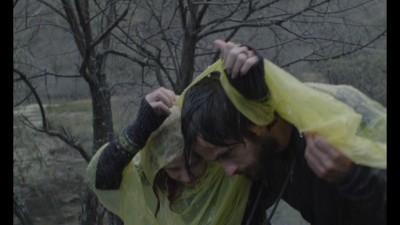
It's a testament to the power of Loktev's film that we need such a lucid serenity-break from time to time; it's an unusually quiet and deliberate but almost crushingly intense experience. She's chosen a simple-appearing but exceedingly delicate and difficult method of conveying the character's emotions onscreen, in all their minute complexity, almost entirely without verbal expression or confrontation, with no explicit articulation or closure on hand; as in life, our intuition and inferences must be brought into play if we want to draw a bead on the multiple concurrent feelings within and between the characters at any given point. But Loktev (with the indispensable aid of her actors, all of whom give brave performances whose apt, genuine naturalism matches the film's with perfect symmetry as they roll through the whirlwinds of their characters' emotions without ever directly telegraphing or overemphasizing a thing for our convenience) does provide us clues of the most ingenious, subtle sort, so we're never truly lost, however unpredictable and close to the vest the film's events, whether in the external/action or interior/affective form, are played; its surface appears imperturbably still, even monolithic, but it's crystal-clear enough to let us see the vastness of unspoken thought and feeling roiling below. The Loneliest Planet is the kind of contemplative cinema that, if we meet it with our actual, attentive contemplation, becomes an overwhelming, almost exhausting juggernaut of intense feeling, the kind that we can't find words for but, as the film's bone-deep impact resoundingly proves, is perfectly capable of being captured and conveyed when an artist like Loktev has the image, sound, and movement of cinema at her disposal.
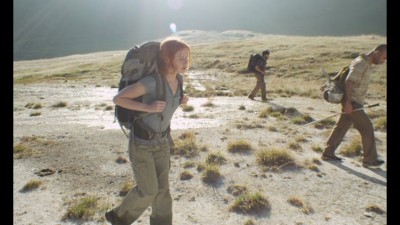
Video:
The film's high-end, high-def digital video photography makes the transition very well, in a transfer that conscientiously maintains the film's unusual (these days, though it was the standard European AR once upon a not so long ago) aspect ratio of 1.66:1. The film's colors are vivid and clear, the variegation in the plays of light and shadow nicely preserved, and compression artifacting kept to a minimum, with no noticeable aliasing and only a brief, near-invisible trace of edge enhancement/haloing at rare moments.
Sound:The Dolby Digital 2.0 soundtrack presents the film's sound mix flawlessly, with all dialogue, ambient natural sound (beautifully recorded and mixed for immediacy, maximizing the film's naturalistic quality), and Richard Skelton's music all full and sonorous, with no imbalance or distortion at any point.
Extras:--An approximately half-hour behind-the-scenes documentary done in a loose, direct-cinema style but capturing every aspect of the shoot and put together in such a way as to work on multiple levels: as a celebration of the small, close-knit cast and crew that made a foray into the Caucasus Mountains for the shoot; as confirmation that the apparent simplicity and naturalness with which the completed film is imbued is the result of the most precise planning, blocking, and direction on the part of director Julia Loktev; and as an enlightening document of the multiple technical and aesthetic challenges that arise when one is shooting a film on almost entirely exterior/big-outdoors location and attempting to frame and create the needed mise-en-scène in such an open space (e.g., crew members lugging reflectors over the vast, hilly, rocky terrain, or Loktev herself rearranging rocks and spreading dirt where it's needed for the characters to walk upon).
--A stills gallery of mountaineering photos by Bidzina Gujabidze, the real-life mountaineer/photographer who makes his acting debut in The Loneliest Planet, who is revealed here as someone working at a much higher level than the guide-for-hire depicted in the film (Gujabidze has, for one thing, climbed Mt. Everest twice).
--The film's theatrical trailer.
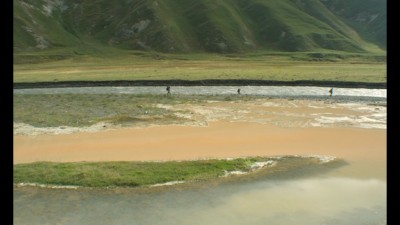
With The Loneliest Planet, writer/director Julia Loktev follows up her extraordinary, unforgettably intense 2006 film Day Night Day Night in an unexpected, much quieter/calmer, but equally harrowing way. With little dialogue and virtually no forthright exposition (leaving us to infer the details, though our attention is well rewarded) the film charts the backpacking trip of two affable, soon-to-be-wed bourgeois bohemians (Gael Garcia Bernal and Hani Furstenburg) from North America who've decided to make the sublimely beautiful, troubled Caucasus mountain region (in the recently civil-war-torn, economically depressed former Soviet Republic of Georgia) their earnestly multicultural, back-to-nature vacation spot, hiring a native Georgian (Bidzina Gujabidze) to take them into the remote mountains and finding their apparently blissful union (and some of what might be their well-meaning but complacent assumptions about the world) deeply challenged by the film's central event. Loktev's narratively and aesthetically radical choices give us these individuals -- their subterranean shifts in their strange new setting and their emotions before and in the wake of that one heightened moment of violence and betrayal -- in a de-dramatized way; the very long, real-time/naturalistically paced sequences of the three hikers traversing the terrain and speaking only normally and casually (i.e., unrevealingly in narrative terms) recalls Gus Van Sant's Gerry, with the actors' faces, slight shifts in body language, and the ways in which Loktev captures them against the landscape our real clues, rich fodder for our ruminations on their states of mind and the shifts in their feelings and relationships. It's a strategy that works here to brilliantly hypnotic effect. So many films unworthy of the attribution have been described as "emotional journeys" that I'm a bit loath to use the term, but this highly sensitive and remarkable film fills those empty words back up: Loktev's quiet, calm, but very assured use of her performers, their movements and the spaces they're moving in, and (most importantly) duration of shots and scenes to slow down screen time takes us through the most complex, contradictory emotional fluctuations so thoroughly that it not only feels like we've been in the characters' physical presence in an unusually meaningful way, but that we've thereby been allowed to experience the ineffable voyages taken by their hearts and minds as well. Highly Recommended.
|
| Popular Reviews |
| Sponsored Links |
|
|
| Sponsored Links |
|
|
| Release List | Reviews | Shop | Newsletter | Forum | DVD Giveaways | Blu-Ray | Advertise |
|
Copyright 2024 DVDTalk.com All Rights Reserved. Legal Info, Privacy Policy, Terms of Use,
Manage Preferences,
Your Privacy Choices | |||||||









